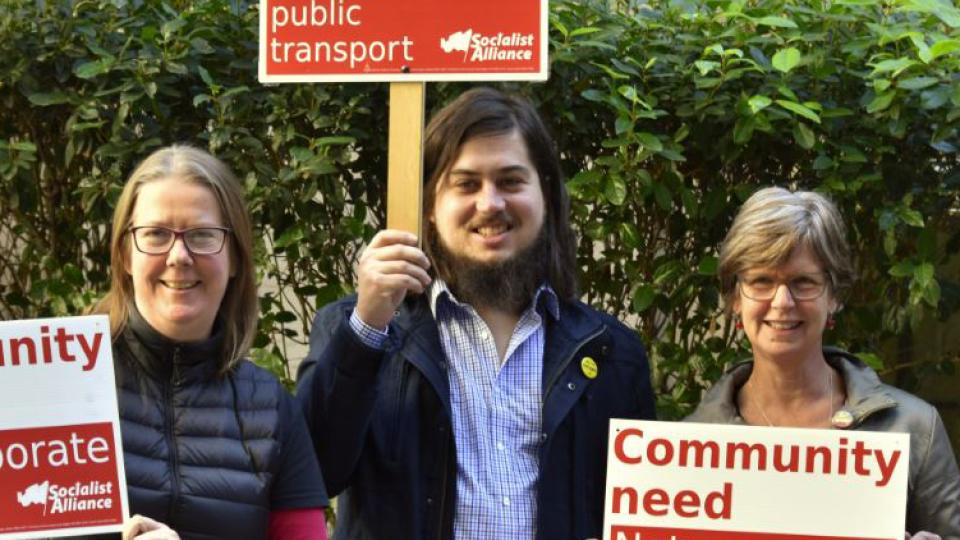Council amalgamations must be reversed say socialist candidates

Premier Gladys Berejiklian’s surprise decision on July 27 to abandon plans for more local council mergers is a win for communities who strongly protested this undemocratic decision said the Socialist Alliance candidates running for position in the Inner West Council in the September 9 election.
“While we welcome the change in policy for those councils which have been given a reprieve, the merger of the three local councils — Ashfield, Marrickville and Leichhardt — into the very large Inner West Council remains fundamentally undemocratic”, said Susan Price who is running for Ashfield ward. “It also begs the question why amalgamated councils are alright for some areas and not others?”
Premier Berejiklian said she was acting to reduce the “risk of uncertainty” on those councils in the lead up to the September 9 election.
That means that she was concerned the courts would find that the amalgamations were unlawful — something communities across the state have been saying since then Premier Baird announced the undemocratic plan. And she is running scared of the electoral backlash.
The decision also gives a reprieve to those councils in predominately Liberal-National heartland. Metropolitan local governments, including Mosman, Willoughby, North Sydney, Lane Cove, Hunters Hill, Ryde, Strathfield, Canada Bay, Burwood, Ashfield, Ku-ring-gai, Hornsby, Woollahra, Randwick and Waverley will no longer be forced to merge.
In the limited consultation that took place in the inner west, residents made it very clear, that, overwhelmingly, they opposed amalgamation for the same reasons as the councils who took legal action against the NSW state government. They were not convinced by the NSW government line that the amalgamations would reduce mismanagement, waste and duplication.
“Now that we can see which councils have been spared forced amalgamation, it is very clear the Liberal-National Berejiklian government has done the electoral arithmetic”, said Pip Hinman, who is running in the Stanmore ward.
“The merger of the inner west councils was a thinly veiled attempt to crush the grassroots opposition to the wasteful WestConnex toll road. But it did not succeed. If anything that opposition, also to UrbanGrowth's plans, has grown.
“Local councils, the closest level of government, are very important for local democracy. They provide resources which keep communities alive and flourishing”, said Blair Vidakovich, who is running in the Leichhardt ward.
“Council mergers have been pushed by conservative state governments across the nation as attempts to stamp out grassroots democracy and resistance to neoliberal big business interests.”
The government's backflip came after the NSW Legislative Assembly passed a bill on June 22, proposed by the Shooters, Fishers and Farmers Party, to make it illegal to force such mergers. The Greens won an amendment which states that no council amalgamation can ever happen again without first holding a referendum in the local area.
While Labor supported this bill, it has come under fire over its lacklustre opposition in council. Leichhardt council minutes show that on two occasions in March and April 2016, Labor councillors voted with the Liberals against investigating legal action against forced amalgamations, and against council running its own polling on the issue.
Socialist Alliance supported the campaign in the Inner West against the forced council merger, and spoke at the community consultations. It also supports the de-merger bill.
“We believe that three original councils should be reconstituted, jobs be re-offered and council offices be utilised. While the three local councils were not without their flaws, they were at least more accessible and accountable than the current Inner West mega-council”, said Price.
“The neo-liberal argument does not stack up. Councils, the closest level of government to the community, must be given more resources and authority to make decisions in an accountable and transparent way. They could do a lot more in solving social problems, such as the dire lack of affordable housing which the NSW government is turning its back on,” added Hinman.
Meanwhile, it was revealed on August 9 that the NSW government is moving to remove council's ability to decide on developments of $5-30 million before the September 9 elections. Minister Andrew Roberts cited “inappropriate relationships” between councillors and developers as the reason. Price called this out as completely undemocratic and said it had more to do with “the far too cosy relationship” between the NSW government and developers.